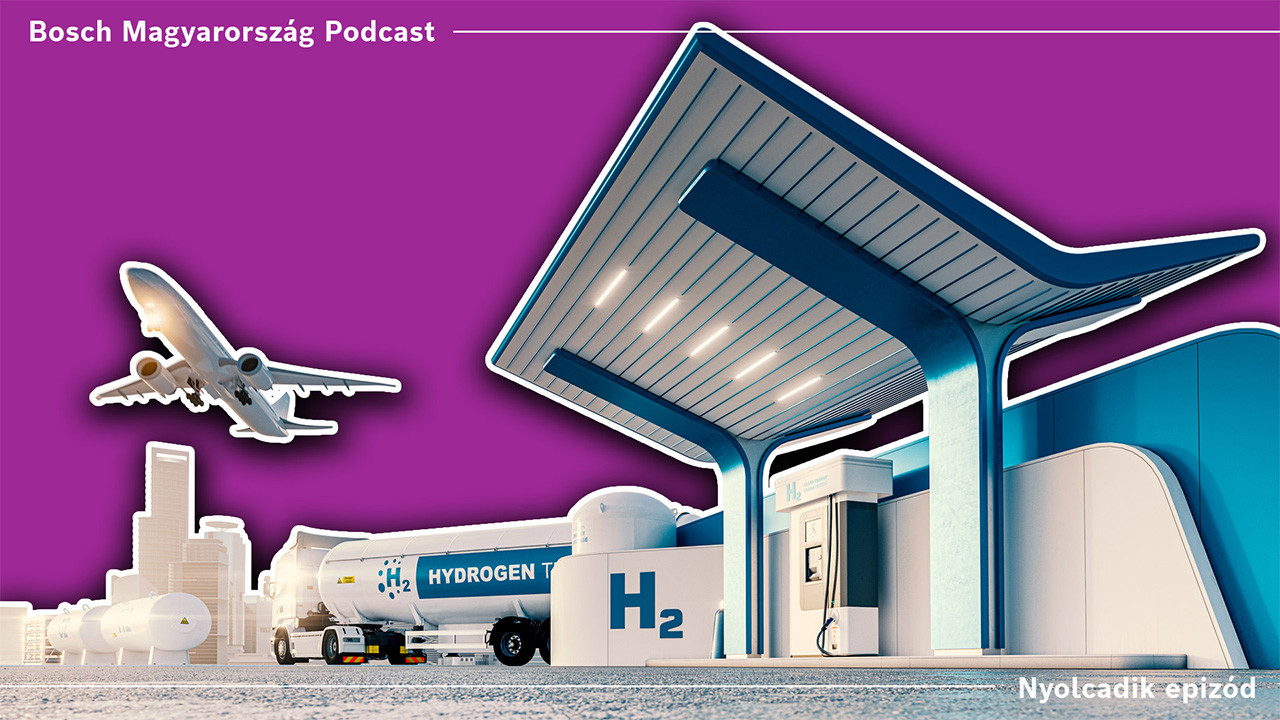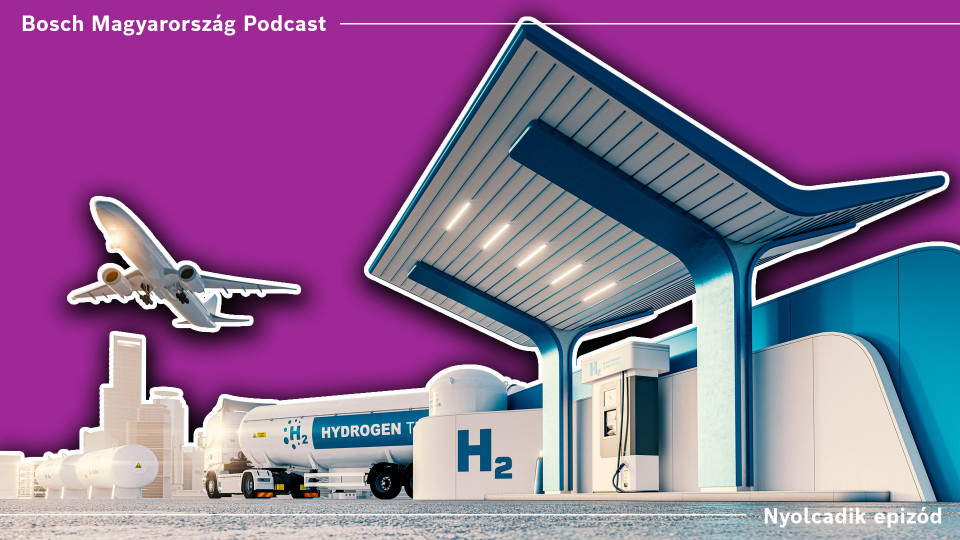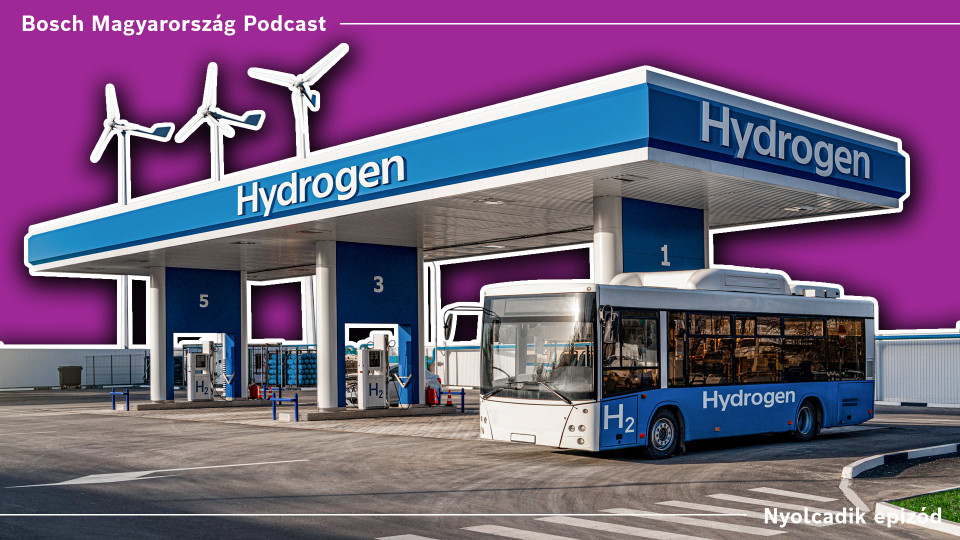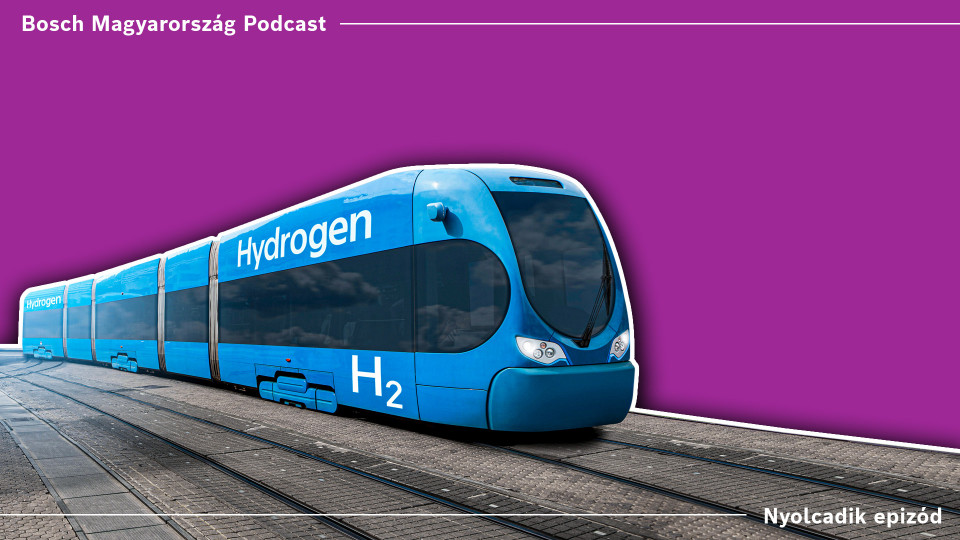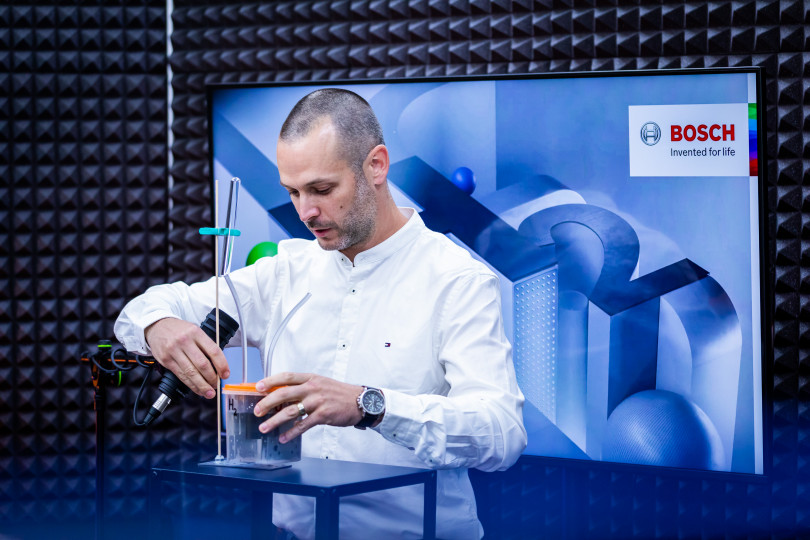Today, it is mainly the propellant of space rockets, but soon trucks and buses may also switch to hydrogen, and it may even play a key role in the operation of factories. Should we be afraid of hydrogen? Could hydrogen also provide electricity for households? How long do we have to wait for the entire energy requirement of our cities to be met by nearby hydrogen cells? Green hydrogen is the energy of the future, which is still at the beginning of its career, but by 2050 our lives will be unimaginable without it. The expert guests of the latest broadcast of Bosch Hungary Podcast discuss the transition of the world economy to green hydrogen, the latest hydrogen-based innovations, Hungary's National Hydrogen Strategy and other topics.
The future of Earth is at stake
The starting gun for the development of the hydrogen economy was fired with the Paris climate agreement, as the world's leading countries have set the goal of reducing global carbon dioxide emissions to net zero by 2050. Achieving the global climate goals is practically impossible without switching to green hydrogen, which means the replacement of today's widespread petroleum, natural gas, coal, i.e. fossil energy carriers in the long-term, according to the latest broadcast of Bosch Hungary Podcast, in which Edit Tóth, digital media manager of the Bosch Group in Hungary, talks to Botond Széles, system development engineer of the Bosch Group in Hungary, and Zsolt Bohner, managing director of Messer Hungarogáz Kft.
All that is hydrogen is not green
Hydrogen is the most abundant, approximately 75%, colourless, odourless element on Earth and in the universe. It is therefore available in almost infinite quantities in its natural form. The challenge is that it is not directly available, but must be extracted from other materials. Industry still uses a large amount of hydrogen today, but this is not yet equal to environmental protection. We can also talk about grey, brown, blue, red, white and green hydrogen, depending on which raw material it is extracted from and how environmentally friendly the applied technology is. From the point of view of climate protection, the goal is to use green hydrogen, since an almost unlimited amount of raw material, specifically water, and electricity from renewable sources are used to produce hydrogen.
Cleaner, faster, further - hydrogen drive in freight transport and public transport
Compared to the batteries of electric vehicles, the mass of hydrogen measured together with the tank and fuel cell is significantly more favourable, so the range of hydrogen-powered vehicles can be much greater and they enable much faster "refuelling" compared to electric charging, highlights Botond Széles, Bosch expert. The rise of hydrogen fuel in high-volume road, rail and water freight transport, as well as in public transport, can almost be taken for granted.
2,800 new hydrogen filling stations along the roads
If we only look at transport, Japan can be considered the pioneer of hydrogen, where there are already 160 hydrogen fuel filling stations. About the same number operate in the European Union, out of which 90 operate in Germany. In the near future, another 2,800 new hydrogen filling stations are planned to open worldwide.
Green hydrogen for a stable power supply
Renewable sources such as solar or wind energy are beneficial from the point of view of climate protection, yet only 13% of the nominal installed renewable capacities are currently utilized during the year. This is because the sun is not shining or the wind is not blowing exactly when and where the energy is needed, and the storage of large amounts of generated electricity is currently not technologically feasible.
In the future, the operation of green hydrogen electrolyzers based on water splitting may provide an answer to this. When excess electricity is produced from renewable sources, these hydrogen generators use it for water splitting (electrolysis) to produce and store hydrogen. Then, when the electricity demand becomes greater than the current electricity production, the accumulated hydrogen is converted into electricity using a fuel cell (reverse electrolysis) and returned to the electrical grid - regardless of night or day, winter or summer.
Bosch: decentralized micro power plants are the future
Currently, 90 million tons of hydrogen are produced worldwide, and the economy's demand for hydrogen may double by 2030. The proportion of hydrogen production based on renewable energy sources is still small, green hydrogen is still at the beginning of its journey to conquer the world, but the goal is clear and many innovations are being developed in the field.
Green hydrogen technological developments are at an advanced stage at Bosch. The company is present in the development of the entire hydrogen value chain, from production to storage and use. According to Bosch's analysis, the future belongs to decentralized hydrogen production due to the reduction of transport costs and energy security. The ultimate goal is to produce and use as much hydrogen as possible with as little ecological footprint as possible, says the Bosch system development engineer in the podcast.
It is getting more and more worthwhile: the cost of water-splitting hydrogen has halved
For the time being, producing hydrogen from water is still more expensive than, for example, extracting it from natural gas. However, while the cost difference between the two procedures was almost four times a few years ago, today the multiplier is only double, points out Zsolt Bohner, managing director of Messer Hungarogáz. As mass production ramps up, cost reduction is expected to continue, and green hydrogen may gradually replace fossil sources. First, green hydrogen can spread in industry and transport, and then, by connecting to electricity networks, it can pave the way for the mass expansion of renewable solar, wind and water energy.
Bosch Hungary Podcast: technology in simple terms
The Bosch Hungary Podcast appears quarterly with the most current topics of innovation and research and development, and with the help of expert guests it searches for easy-to-understand answers to the most pressing questions of future technology. If you want to learn more about the future of the hydrogen economy, you can watch the podcast on the Youtube channel or listen to Bosch Hungary, Spotify, Apple Podcasts, Google Podcasts and Simplecast podcast channels.
Further information:
How Bosch's hydrogen fuel cell drive works
https://www.youtube.com/watch?v=Y8Pu3IoQLO8
Zita Hella Varga
Phone: +36 70 667-6374
Bosch has been present in Hungary since 1898 with its products. After its re-establishment as a regional trading company in 1991, Bosch has grown into one of Hungary’s largest foreign industrial employers with currently eight subsidiaries. In fiscal 2022 it had total net sales of 2.255 billion forints and consolidated sales to third parties on the Hungarian market of 314 billion forints. The Bosch Group in Hungary employs more than 18,300 associates (as of December 31, 2022). In addition to its manufacturing, commercial and development business, Bosch has a network of sales and service operations that covers the entire country.
The Bosch Group is a leading global supplier of technology and services. It employs roughly 421,000 associates worldwide (as of December 31, 2022). The company generated sales of 88.2 billion euros in 2022. Its operations are divided into four business sectors: Mobility Solutions, Industrial Technology, Consumer Goods, and Energy and Building Technology. As a leading IoT provider, Bosch offers innovative solutions for smart homes, Industry 4.0, and connected mobility. Bosch is pursuing a vision of mobility that is sustainable, safe, and exciting. It uses its expertise in sensor technology, software, and services, as well as its own IoT cloud, to offer its customers connected, cross-domain solutions from a single source. The Bosch Group’s strategic objective is to facilitate connected living with products and solutions that either contain artificial intelligence (AI) or have been developed or manufactured with its help. Bosch improves quality of life worldwide with products and services that are innovative and spark enthusiasm. In short, Bosch creates technology that is “Invented for life.” The Bosch Group comprises Robert Bosch GmbH and its roughly 470 subsidiary and regional companies in over 60 countries. Including sales and service partners, Bosch’s global manufacturing, engineering, and sales network covers nearly every country in the world. With its more than 400 locations worldwide, the Bosch Group has been carbon neutral since the first quarter of 2020. The basis for the company’s future growth is its innovative strength. At 136 locations across the globe, Bosch employs some 85,500 associates in research and development, of which nearly 44,000 are software engineers.
Additional information is available online at www.bosch.hu, iot.boschblog.hu, www.bosch.com, www.iot.bosch.com, www.bosch-press.com, www.twitter.com/BoschPresse

